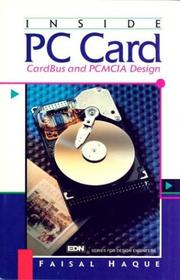| Listing 1 - 2 of 2 |
Sort by
|

ISBN: 1281112445 9786611112448 0080534732 0750697474 9780080534732 9780750697477 9781281112446 6611112448 Year: 1996 Publisher: Boston Newnes
Abstract | Keywords | Export | Availability | Bookmark
 Loading...
Loading...Choose an application
- Reference Manager
- EndNote
- RefWorks (Direct export to RefWorks)
PC Card (or PCMCIA) technology allows computers to interface with each other using less space than conventional interfaces. Currently, most applications are in the personal computing market, to enhance peripheral capabilities. As the industry changes, the applications will grow outside of the PC arena, into areas such as medical instrumentation and digital cameras, where peripheral expansion was previously unavailable.One of the advantages of this book over others is that it does more than repeat standards or list suppliers. It actually describes and demonstrates design examples which
PCMCIA cards (Microcomputers)--Design. Microcomputers--Buses. --- PCMCIA cards (Microcomputers) --- Microcomputers --- Electrical & Computer Engineering --- Engineering & Applied Sciences --- Electrical Engineering --- Design --- Buses --- Design. --- Buses. --- Buses (Microcomputers) --- Microbuses (Computers) --- Microcomputer buses --- Cards, PCMCIA --- PC cards --- PCMCIA PC cards --- Personal Computer Memory Card Industry Association cards --- Bus conductors (Electricity) --- Data transmission systems --- Computer peripherals --- Expansion boards (Microcomputers)
Digital
ISBN: 9780080534732 0080534732 1281112445 9781281112446 9786611112448 6611112448 Year: 1996 Publisher: Boston Newnes
Abstract | Keywords | Export | Availability | Bookmark
 Loading...
Loading...Choose an application
- Reference Manager
- EndNote
- RefWorks (Direct export to RefWorks)
Metabolic syndrome is a set of risk factors that includes: abdominal obesity, a decreased ability to process glucose (insulin resistance), dyslipidemia (unhealthy lipid levels), and hypertension. Patients who have this syndrome have been shown to be at an increased risk of developing cardiovascular disease and/or type 2 diabetes. Metabolic syndrome is a common condition that goes by many names (dysmetabolic syndrome, syndrome X, insulin resistance syndrome, obesity syndrome, and Reaven's syndrome). This is the first book to fully explain the relationships between psychiatric illness, Metabolic.
| Listing 1 - 2 of 2 |
Sort by
|

 Search
Search Feedback
Feedback About UniCat
About UniCat  Help
Help News
News